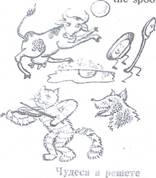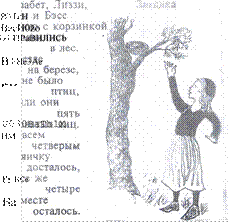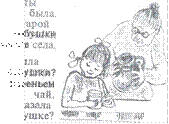
Праздник английской поэзии
Цель: познакомить школьников с англииской фольклорной поэзией.
Работа над стихами воспитьвает у детей чувство прекрасного, любовь к поэзии.
При этом решаются следующие заДачи:
- отрабатываются произношение и навык выразительного чтения;
- закрепляется пройденный лексический и грамматический материал;
- расширяется лексический запас учащихся;
- приобретаются знания о быте, традициях народа;
- учащиеся получают первое представление о поэтическом переводе.
Английские народные стихи для детей (Nursery Rhymes) занимают значительное место в англоязычной литературе. Они издавна привлекали к себе внимание выдающихся русских поэтов.
Они привлекали их своей музыкальностью, юмором и другими достоинствами. Очень популярны в нашей стране переводы- переложения Корнея Чуковского и Самуила Маршака.
![]() Мастерством переводчика владели многие известные поэты
русской поэзии. Назовем их имена Александр Пушкин, Михаил Лермонтов, Иван
Тургенев, Алексей Толстой и многие другие.
Мастерством переводчика владели многие известные поэты
русской поэзии. Назовем их имена Александр Пушкин, Михаил Лермонтов, Иван
Тургенев, Алексей Толстой и многие другие.
Сегодня мы хотим познакомить вас с творчеством Самуила Яковлевича Маршака. Мы очень хорошо знаем Маршака как автора книг для детей. Его стихи — спутники детства каждого ребенка. Вспомните только его стихи, знакомые всем с детства:
Но Михалков не только писал стихи, он еще был великолепным мастером перевода.
Самуил Яковлевич Маршак родился в 1887 году в городе Воронеже. Будущий поэт рано полюбил стихи. Четырех лет от роду он пытался сам сочинять стихотворные строчки, а в 11 лет, когда стал учиться в гимназии, уже переводил древнегреческого поэта Горцария.
Когда Маршаку исполнилось 25 лет, он уехал в Англию и поступил в
Лондонский университет, на факультет искусств. Там же училась его жена.
На факультете он основательно изучал английский язык. Маршак вместе со своей женой совершали прогулки пепжом по стране. Останавливались на ночлег в деревнях, маленьких провинциальных городах. Они изучали язык, историю страны, нравы, обычаи народа.
Маршак изучал английский язык всю жизнь. Это было связано с его работой переводчика. К своему труду Маршак относился очень ответственно.
Сейчас мы послушаем английские детские стихи в
переводе Самуила Яковлевича Маршака. Стихи исполняют учащиеся 4-х, 5-х классов.
2BeAY111Hh•. Pe6na, Bbl Ha ypoKax OgeHb MHOFO CTHXOTBOPeHHü y KOTOPb1X eCTb
JIHTepaTypHb1ìi nepeB0A H ceñqac yqaruuecq TpeTbero Knacca r10Ka*cyr Batsa cueHKY " Three Little Kittens", a Mr. Rule npotMTaeT nepeB011 C. H. MapmaKa 3Toro CTHXOTBOPeHH¶.
"THREE LITTLE KITTENS"
Characters:
Author, Mother Cat, F Kitten, 2nd Kitten, 3rd Kitten.![]()
SCENE
Author: The three little kittens Lost their mittens,
And
they began to cry.![]()
![]() Kitten:
Oh, Mother dear, pnd Kitten: We very much fear.
Kitten:
Oh, Mother dear, pnd Kitten: We very much fear.
3rd Kitten(crying): That we have lost our mittens!
![]() Cat:
Lost your mittens,
Cat:
Lost your mittens,
You naughty kittens!
Then you will have no pie. (The Kittens run away)
Author: The three little kittens
Found their mittens,
And they began to
cry. ![]() (The Kittens run in)
(The Kittens run in)
Three
little Kittens(together):th, Mother Dear, ![]()
1 st Kitten: (showing the mittens): See here,
2nd Kitten (showing the mittens): See here,
3rd Kitten (showing the mittens): See , we have found our mittens.
Cat: Oh, you're good kittens!
![]()
![]() Put
on your mittens,
Put
on your mittens,
And you will have some pie. (Gives them pies) But I smell a mouse close by.
(All together):We smell a mouse close by. Good- buy. (The Cat and Kittens leave the stage)
Mr.
Rule: C. q. MapmaK![]()
r10TePEIH KOT¶TKH Ha Aopore nepgaTKH H B cne3ax 11PHÕexaJIH A0M0ìí.
- Mapaa, Map.aa, lipocrrn Mbl He MO)KeM HaÜTH Mbl He MO)KeM HaüTH
IlepqaTKH!
-110Tep¶JIH nepgaTKH?
BOT aypHb1e KOTITKH!
BaM Hb1Hge He aaM nupora.
Mgy-M¶Y He aaM
Mgy-Mqy
He![]()
Bared Hb1Hqe He aaM nupora!
1106e)KaJIH KOT¶TKH,
OTb1CKUIH nepqaTKH
H CMeqCb npH6exaJIH AOMOü.
MaMa ,MaMa He 331HCb.
T10TOMv HTO Ha111JIHCb
ITOTOMY I-ITO Ha111JIHCb
IlepqaTKH!
-OTHCKEIH nepqaTKH?
BOT cnacH60 , KOTÃTKH!
3a 3T0 BaM aaM rmpora,
Myp-Myp-Myp, 11Hpora,
Myp-Myp-Myp, rmpora,
3a 3T0 BaM aaM rmpora.
PBeÄY111Hìí: A ceìíqac elllë 3aqwraf0 eruë CTHXOTBOPeHH¶, a Bbl BC110MHHTe HX nepeB0A H 110JIYHHTe >KeTOH.
Humpty-Dumpty sat on the wall,
Humpty-Dumpty had a great fall
All the king's horses and all the king's men Cannot put Humpty together again.
I-Llazmaù-bonmaù cuðejl Ha cmeue
Illazmaù-baamaù ceaztucg eo Chie.
BC" Koponegacaa KOHHUZ'a,
BCR Roponeeocag pamb
He M0Jcem Illaamas, He M0Dfcem Boazmasl, ILIanmag-B0J1maa, boumag-lllanmaa, Illamza,g-bonman coõpamb.
There was an old woman
Lived under a hill She put a mouse in a bag
And sent it to the mill
The miller did swear
By the point of his knife,
He never took toll
![]()
Of a mouse in his life
OÒHa01CÒb1 cmapyuŒa y Hac eopoòKe
Ilocnaza Ha Me,'1bHUIÐ' Mbzuucy 8 vueuŒe. Ho MCIbHUK nu Mbuueù He MOJIWI, A ecau MOJIOJI, mo He 6pœ13a no,uon.
Donkey,donkey, old and grey,
Open your mouth and gently bray.
List your ears and blow your horn,
To wake the world this sleepy morn.
Hey diddle diddle,
The cat and the fiddle,
The cow jumped over the moon;
The little dog laughed
To see such sport,
And
the dish ran away with  the spoon.
the spoon.
HrpaeT KOT Ha cKphr1Ke,
Ha 6moae IIJISILI.IYT Pb16KH,
KopoBa B306paracb Ha He6eca. C6e)KaJIH yaUIKH, 6mouua, A 110111aaH CMežOTCfl.
![]() BOT, — TOBOPflT, — KaKY1e gyneca!
BOT, — TOBOPflT, — KaKY1e gyneca!
![]()
Elizabeth, Elspeth, Betsy, and Bess, They all went together to seek a bird's nest; They found a bird's nest with five eggs in, They all took one. and left four in.
 3.1fi3a6eT.
ÄM33H,
3.1fi3a6eT.
ÄM33H,
HauiÆ[
Flo
P a3raaxa
XOTb![]()
![]()
Ha3BaHb1 uecb HMeHa
(9JIÚ3a6er, JIH33H, b3TCH H B3cc),
Ho Tax Ha3b1BU1acb AeBHOHKa OAHa.
OHa H XOAHJ1a
![]()
Little Nancy Etticoat,
With a white petticoat,
And a red nose;
She has no feet or hands, The longer she stands,
The shorter she grows.
CBeqa
TOHKan aeBHOHKa, Benaq }06LIOHKa, KpacHb1ìi HOC.
I-IeM DIHHHee HOHH, TeM OHa Kopoqe
OT rop}ot-1Mx c.ne3.
This is the key of the kingdom. In that kingdom there is a city.
In that city there is a town.
In that town there is a street.
In that street is a lane.
In that lane there is a yard.
In that yard there is a house. In that house there is a room.
In that room there is a bed.
On that bed there is a basket.
In that basket there are some flowers.
ICJIIOII 0T KOPOJ1eBCTBa
BOT
Batvl 0T![]()
B ROPO.neBCTBe — rop0J1,
A B ropoAe — yarmua,
A Ha eCTb ABOP,
Ha zwope — Bblc0K1åii 6710M, B 3TOM ,710Me — crraAeHKa.
B CliaJ1bHe - RO.M6e.Ï1bKa.
B
KOJIb1ÓC1bKe — .71aHAb11Lteii ![]() KOP3HHa.
KOP3HHa.
flaHAb11ueii, JlaHJ1bT111eii Il-o.üaq K01)3HHa.
Three little kittens they lost their mittens, And they began to cry, Oh, Mother dear, we sadly fear That we have lost our mittens. What! Lost your mittens, you naughty kittens!
Then you shall have no pie. Miee-ow. miee-ow, miee-ow, No, you shall have no pie.
The three little kittens they found their mittens. And thev began to cry, Oh, Mother dear, see here, see here, For we have found our mittens.
Put on your mittens, you silly kittens, And you shall have some pie.
Purr-r, purr-r, purr-r,
Oh, let us have some pie.
IlepqaTKH
![]() KOTflTKH Mny-MHY,
He naM,
KOTflTKH Mny-MHY,
He naM,
![]() Tla
nopore nepyaTKH
Tla
nopore nepyaTKH
![]() B
c,'1e3ax 111)H6exaJIH
B
c,'1e3ax 111)H6exaJIH
|
AOMOÜ. |
rmpora. |
|
|
n06e>KïLÐM KOTHTIÇM, |
|
Mbl He HaìiTH, |
()Tb1CKaJIH nepyaTK1d |
|
Mbl He MO,'KCM HaìiTH |
PI, CMeflCb, 111)H6exaJIH |
|
flepqaTKH! |
N0M0ìi. |
|
— flo•repflJIH IlepqaTKH? |
|
|
BOT AY1)Hb1e KOTSITKH! |
110TOMY t1TO Ha111JIHCb, |
|
51 BŽžM Hbll-ltle He AaM |
TIOTOMY t1T0 Ha111JIHCb |
|
ITHpora. |
IlepqaTKH! |
|
|
Myp-Myp-Myp, flHpora, |
|
BOT cnacH60 KOTHTKII! |
Myp-Myp-Myp, 11Hpora, |
|
3a 3T0 BaM Aa,M |
51 aa 3'1'0 BaM aaM |
|
rwpora. |
rmpora! |
![]()
![]()
![]() Pussy cat, pussy cat, where have you been?
Pussy cat, pussy cat, where have you been?
I've bcen to London to look at the Queen.
Pussy cat, pussy cat. what did vou do there?
I frightened a little mouse under her chair.
![]() B rocTÃX y KOPO.üeBbž
B rocTÃX y KOPO.üeBbž
— Fae Tbl 6btaa ceroÄHfl, Klicžca?
![]() Y Kopo.i1eBb1 y
am-.'1]1ficK0ii.
Y Kopo.i1eBb1 y
am-.'1]1ficK0ii. ![]() I-ITO
Tbl ABope?
I-ITO
Tbl ABope?
![]()
Robin the Bobbin, the big-bellied Ben,
He ate more meat than fourscore men; He ate a cow, he ate a calf, lie ate a butcher and a half,
![]() Bfe -he sleepJey
Bfe -he sleepJey
He ate the priest and all the people!
A cow and a calf,
An ox and a half, A church and a steeple.
And all good people.
And yet he complained that his stomach wasn't full.
Poó1fH-Boó1if1
PoóMH-130óHH Roe-Karc Ilo;ucpenwžcfl
Ha•rotuaK.•
C'be.71 •reueH\ca y•rpoM paž10, ![]() ogeqež( H 6apaHa,
ogeqež( H 6apaHa,![]()
PI npwraB0K c MHC.HHROM,
COTHIO >KaBOPOHIÇOB B Tec-re 1/1 KOHA c •reueroii B,vecre,
IIflTb ue1)KBeii ICOJÍOKO.qeH ![]()
Aa etue![]()
![]() A man in the wilderness asked me,
A man in the wilderness asked me,
How many strawberries grow in the sea?
I answered him, as I thought good,
As many red herrings as swim in the wood.
Bonpoc H OTBeT Cllpoc1L1 Mewl ro-aoc B AHKOÅ:
— MHoro B Mope
Pac-re-r 3eMJ151HHKH?
— CTOJibRO HO, CKOJJbKO
![]() COJ1eHb1X
COJ1eHb1X
PacTe•r I-Ia 6epe3ax 1/1 e:ncax 3ureHb1X.
![]()
Humpty-Dumpty
Humpty-Dumpty sat on a wall,
Humpty-Dumpty had a great fall,
All the king's horses,
And all the king's men
Couldn't put Humpty together again.
Illa.TTaü-b0JITañ LIlaJITafi-b0ATa1Y1 Cv•rnejl Ha (2TeHe.
IllaJITaii-E0ÄTaii
CBaAHj1CÃ BO CHe.
BCH KopoaeBCKasž KOHHHua,
BCH rcopo:yeBcžcaH paTb
He MO)K-eT LLIa-TITaH. He MO)Kev b0JITaa,
![]() BOJITan,
BOJITan,
Bo.wra51-IlIaJ11äRfl,
Illayrrafl-bourasl c06paTb!
![]()
Littže Girt
![]() Little girl, little girl,
Little girl, little girl,
Where have you been?
I've been to see grandmother Over the green.
— What did she give you? Milk in a can.
—- What did you say for it? Thank you, grandam.
— Ma-qeHbKaà aeB0¼Ka,
 CKaXH, rae
CKaXH, rae
— Bhina y cTapcui
Ha TOM
![]() LITO
Tbl r,Hna y — rlma c
LITO
Tbl r,Hna y — rlma c
— HTO Tbi cKa3œra
6a6YMIKe?
«CnacHõo» H
«npoluaii».
![]()
Baa, baa, black sheep, Have you any wool?
Yes, sir, ves, sir,
Three bags full;
One for the masr-?ž-. And one for the dame.
And one for the little ![]() Who lives
Who lives![]()
Bapa1žyeR

OAHH MelMOK X03flHHY,
Apyroii Me1110K X03HHKe.
A — aeTflM MaJ1eHbK1åM
Ha![]()
Материалы на данной страницы взяты из открытых источников либо размещены пользователем в соответствии с договором-офертой сайта. Вы можете сообщить о нарушении.